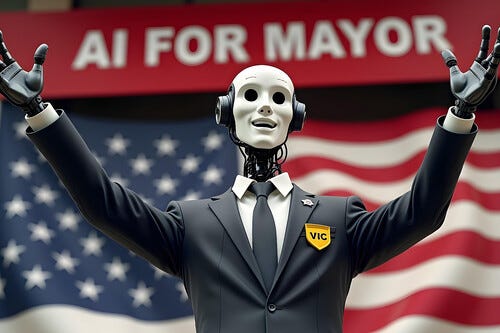
Cheyenne, Wyoming — In a twist that feels like it was ripped straight from a science fiction novel, Victor Miller, a librarian with a penchant for tech, has launched a bid to become mayor of Cheyenne, Wyoming. But Miller isn’t your typical mayoral candidate — far from it. He’s promised to hand over the reins of city governance to an AI chatbot named VIC (Virtual Integrated Citizen) if he wins.
This is uncharted territory, folks. Never before in American history has a candidate proposed to let artificial intelligence lead a city.
As Cheyenne’s voters cast their ballots, there’s a mix of curiosity, skepticism, and a healthy dose of unease about what this could mean for the future of governance. Is this a glimpse into a future where data drives every decision, free from human error and bias? Or is it a step too far, handing over the complex and often emotional task of leadership to a machine?
Who Is Victor Miller, and What Is VIC?

Victor Miller isn’t a politician by trade. He’s a librarian, a man who’s spent his career surrounded by knowledge, and who’s clearly been paying attention to the rapid advancements in AI. With his creation, VIC, Miller is betting that a machine can do what humans can’t: make decisions free from the messy tangle of emotions, biases, and personal agendas that come with political power.
VIC is a customized AI built on the architecture of ChatGPT. According to Miller, it’s designed to process vast amounts of information, weigh options without prejudice, and deliver solutions based purely on logic and data.
“Humans are inherently biased,” Miller remarked recently. “VIC doesn’t suffer from emotional decision-making or personal agendas. It’s programmed to serve the citizens of Cheyenne based on data, facts, and fairness.”
What Would an AI Mayor Look Like?

Imagine a city where decisions aren’t swayed by lobbyists, personal connections, or the heat of the moment. Instead, they’re driven by cold, hard data. That’s Miller’s vision for Cheyenne. If elected, VIC wouldn’t replace the city council or other elected officials, but it would act as the brain behind the operations, analyzing everything from traffic patterns to environmental data, and making recommendations that Miller would then implement.
This AI-driven approach could mean more efficient road repairs, smarter sustainability initiatives, and data-backed crime prevention strategies. In Miller’s mind, VIC could create a government that’s transparent, efficient, and immune to corruption — qualities that are often in short supply.
Positive Use Cases for an AI-Governed City?

There’s no denying the appeal of VIC’s promise. In theory, AI could revolutionize how cities are run, eliminating the human errors and biases that have plagued governance for centuries. With its ability to process and analyze data on a scale that no human could match, VIC could lead to more informed, effective decision-making.
Transparency is another potential win. VIC’s decision-making processes could be made public, allowing citizens to see exactly how and why decisions are made. Imagine the trust that could build in a government where every choice is laid out in black and white, with no room for manipulation or backroom deals.
The Ethical Dilemmas and Practical Concerns
But not everyone is sold on the idea of an AI mayor. Critics argue that no matter how advanced, AI lacks the empathy, moral judgment, and cultural understanding necessary to lead a community.
“Data doesn’t capture the full human experience,” one of Miller’s opponents argued in a recent debate. “A machine can’t understand the nuances of our community, our values, or our struggles.”
Accountability is another sticking point. If VIC makes a decision that backfires, who’s to blame? Miller? The AI’s developers? Or is the AI itself at fault? These are questions that delve into uncharted legal and ethical waters, and they’re not easy to answer.
There’s also the issue of privacy. For VIC to function effectively, it would need access to a vast amount of data — some of it potentially sensitive. Ensuring this data is protected from misuse or hacking is a significant concern, especially in an era where cyber threats are all too real.
A Gimmick or a Glimpse Into the Future?

As the polls close and the votes are tallied, one thing is certain: whether or not Miller wins, this campaign has already made history. The very fact that an AI candidate is being seriously considered for a mayoral role is a testament to how rapidly technology is reshaping our world.
If Miller does pull off a win, Cheyenne could become a testing ground for AI in governance — a case study that could either pave the way for future AI-driven administrations or serve as a cautionary tale. If he loses, it might prompt a broader conversation about the role of technology in our political system and where we should draw the line.
In the end, it’s up to the citizens of Cheyenne to decide whether they’re ready to embrace this bold, tech-driven experiment or if they prefer the familiar touch of human leadership.
One thing is clear: the intersection of technology and politics is only beginning to unfold, and the journey ahead promises to be as fascinating as it is unpredictable.




Comments (0)